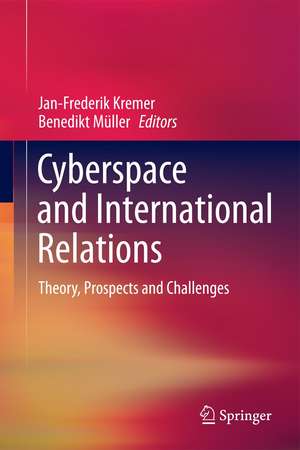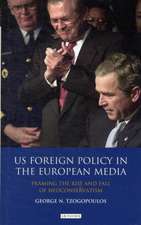Cyberspace and International Relations: Theory, Prospects and Challenges
Editat de Jan-Frederik Kremer, Benedikt Mülleren Limba Engleză Hardback – 20 noi 2013
In the first part, concepts and theories are presented to shed light on the relationship between cyberspace and international relations, discussing implications for the discipline and presenting fresh and innovative theoretical approaches.
Contributions in the second part focus on specific empirical fields of activity (security, economy, diplomacy, cultural activity, transnational communication, critical infrastructure, cyber espionage, social media, and more) and address emerging challenges and prospects for international politics and relations.
Toate formatele și edițiile
| Toate formatele și edițiile | Preț | Express |
|---|---|---|
| Paperback (1) | 776.37 lei 6-8 săpt. | |
| Springer Berlin, Heidelberg – 27 aug 2016 | 776.37 lei 6-8 săpt. | |
| Hardback (1) | 782.52 lei 6-8 săpt. | |
| Springer Berlin, Heidelberg – 20 noi 2013 | 782.52 lei 6-8 săpt. |
Preț: 782.52 lei
Preț vechi: 954.29 lei
-18% Nou
Puncte Express: 1174
Preț estimativ în valută:
149.78€ • 162.75$ • 125.90£
149.78€ • 162.75$ • 125.90£
Carte tipărită la comandă
Livrare economică 19 aprilie-03 mai
Preluare comenzi: 021 569.72.76
Specificații
ISBN-13: 9783642374807
ISBN-10: 3642374808
Pagini: 350
Ilustrații: XXIV, 284 p. 2 illus.
Dimensiuni: 155 x 235 x 22 mm
Greutate: 0.61 kg
Ediția:2014
Editura: Springer Berlin, Heidelberg
Colecția Springer
Locul publicării:Berlin, Heidelberg, Germany
ISBN-10: 3642374808
Pagini: 350
Ilustrații: XXIV, 284 p. 2 illus.
Dimensiuni: 155 x 235 x 22 mm
Greutate: 0.61 kg
Ediția:2014
Editura: Springer Berlin, Heidelberg
Colecția Springer
Locul publicării:Berlin, Heidelberg, Germany
Public țintă
ResearchCuprins
Foreword.- Introduction.- Part I: The Cyberspace and IR - Theory.-Power Technology and Powerful Technologies - Global Governmentality and Security in the Cyberspace.- Cyber War and Strategic Thought - Do the Classic Theorists Still Matter? - SAM - A Framework to Understanding Emerging Challenges to States in an Interconnected World.- In Search of Cyber Stability - International Relations, Mutually Assured Destruction and the Age of Cyber Warfare.- Offense-Defense Balance in Cyber Warfare.- The Utility of Timeless Thoughts - Hannah Arendt's Conceptions of Power and Violence in the Age of Cyberization.- Part II: The Cyberspace and IR - Prospects and Challenges.- Clarifying the International Debate on Stuxnet - Arguments for Stuxnet as an Act of War.- A New Way of Conducting War - Cyberwar, Is That Real? - Peacekeeping 4.0 - Harnessing Potential of Big Data, Social Media, and Cyber Technologies.- US Leadership in Cyberspace - Transnational Cyber Security and Global Governance.- Hierarchies in Networks - Emerging Hybrids of Networks and Hierarchies for Producing Internet Security.- How the 2010 Attack on Google Changed the US Government's Threat Perception of Economic Cyber Espionage.- Cooperative International Approaches to Network Security - Understanding and Assessing OECD and ITU Efforts to Promote Shared Cybersecurity.- Phreak the Speak - The Flawed Communications within Cyber Intelligentsia.- Reflections on Virtual to Real - Modern Technique, International Security Studies and Cyber Security Environment.- Index.
Notă biografică
Jan-Frederik Kremer heads the research group “Economy and Finance” at the Center for Global Studies, University of Bonn, where he works as research fellow and lecturer. He studied Political Science, History, Economics and Philosophy at the Ruhr University Bochum and is PhD Candidate in the PhD program “International Development Studies” at the Institute of Development Research and Development Policy (IEE) and member of the DFG funded “Research School”. He was awarded several scholarships, like the Bronnbacher Scholarship and numerous DAAD and DFG travel and conference grants. He was a visiting scholar at the Miami-Florida European Union Center, University of Miami, and at the University of the Western Cape, South-Africa. He is (co)-author and (co)-editor of a number of publications, like “Power in the 21st Century – International Security and International Political Economy in a Changing World”, “Towards an New Understanding of Structural Power”, “Global Power Europe, Volume 1 and 2” and “Innovative Capabilities and Market Performance: The European Union in International Comparison”. Jan-Frederik presents his work frequently at major international (ISA, BISA, ECPR) and national (DGPW) conferences. Jan-Frederik is also Co-Initiator of cnsltnts and has conducted consultancy projects in South-Africa, the US and Germany.
Benedikt Müller is a technology consultant at Accenture with prior work experience as a technical sales professional at IBM. He holds a Bachelor's degree in International Management and a Master's degree in IT Management. His research interests revolve around the business impact of technology and the political and economic impact of cyber security.
Benedikt Müller is a technology consultant at Accenture with prior work experience as a technical sales professional at IBM. He holds a Bachelor's degree in International Management and a Master's degree in IT Management. His research interests revolve around the business impact of technology and the political and economic impact of cyber security.
Textul de pe ultima copertă
Cyberspace is everywhere in today’s world and has significant implications not only for global economic activity, but also for international politics and transnational social relations. This compilation addresses for the first time the “cyberization” of international relations - the growing dependence of actors in IR on the infrastructure and instruments of the internet, and the penetration of cyberspace into all fields of their activities. The volume approaches this topical issue in a comprehensive and interdisciplinary fashion, bringing together scholars from disciplines such as IR, security studies, ICT studies and philosophy as well as experts from everyday cyber-practice.
In the first part, concepts and theories are presented to shed light on the relationship between cyberspace and international relations, discussing implications for the discipline and presenting fresh and innovative theoretical approaches.
Contributions in the second part focus on specific empirical fields of activity (security, economy, diplomacy, cultural activity, transnational communication, critical infrastructure, cyber espionage, social media, and more) and address emerging challenges and prospects for international politics and relations.
In the first part, concepts and theories are presented to shed light on the relationship between cyberspace and international relations, discussing implications for the discipline and presenting fresh and innovative theoretical approaches.
Contributions in the second part focus on specific empirical fields of activity (security, economy, diplomacy, cultural activity, transnational communication, critical infrastructure, cyber espionage, social media, and more) and address emerging challenges and prospects for international politics and relations.
Caracteristici
Presents new theoretical approaches on IR and cyber security Broadens the understanding of how international relations are influenced by cyber issues Innovative, comprehensive and interdisciplinary approach Brings together well-known experts and scholars from various disciplines Includes supplementary material: sn.pub/extras















